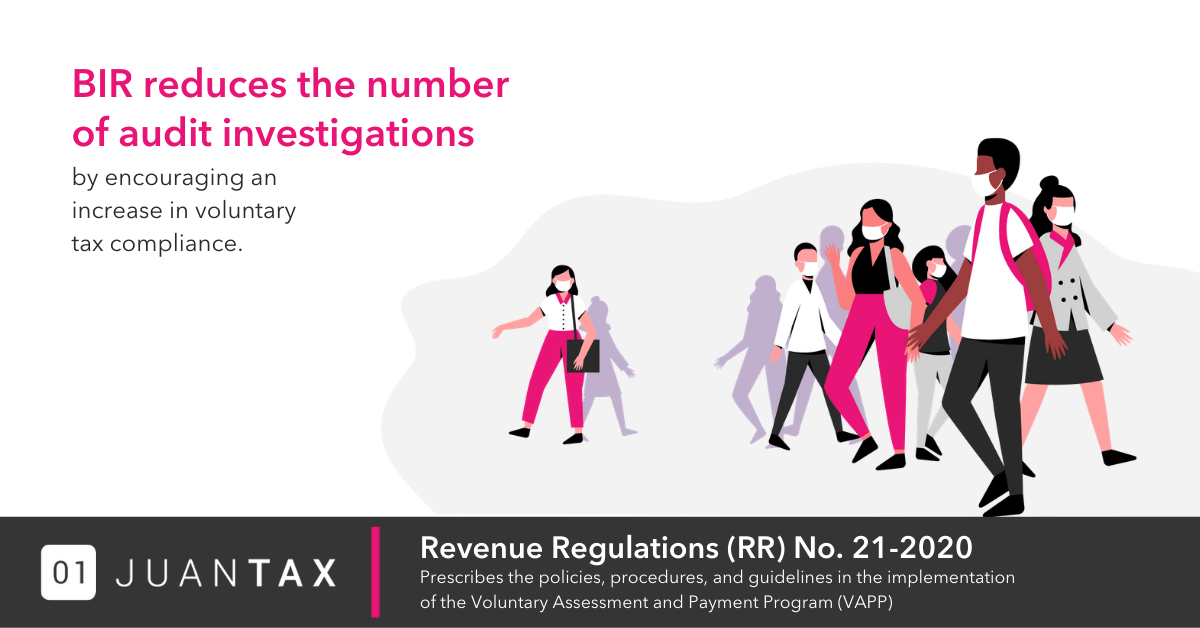Due to COVID-19 the Bureau of Internal Revenue (BIR) is reducing the number of audit investigations by encouraging an increase in voluntary tax compliance. This is to limit taxpayer contact and apply related protocols and social distancing measures while, at the same time, maximizing revenue collection with the least administrative costs.

Revenue Regulations (RR) No. 21-2020 issued on September 4, 2020, prescribes the policies, procedures, and guidelines in the implementation of the Voluntary Assessment and Payment Program (VAPP) for Taxable Year 2018 under certain conditions.
These Regulations shall apply to all internal revenue taxes covering the taxable year ending December 31, 2018, and fiscal year 2018 ending on the last day of the months of July 2018 to June 2019, including taxes on one-time transactions (ONETT) such as estate tax, donor’s tax, capital gains tax (CGT), as well as ONETT-related creditable withholding tax (CWT)/expanded withholding tax (EWT) and documentary stamp tax (DST).
Taxpayers who erroneously paid or failed to pay such taxes for the covered periods for some reason may avail themselves of the VAPP, except those with a final assessment notice (FAN); under investigation due to a tax informer’s verified information; with fraud cases; and with pending tax-evasion cases and other similar lawsuits.
Qualified persons can avail of the benefits of the VAPP until December 31, 2020, unless extended by the Secretary of Finance. To avail the benefits under these Regulations the taxpayer-applicant shall signify his intention by applying through submission of the following requirements:
- Duly accomplished Application Form [BIR Form No. 2119 (Annex A) – 2 copies];
- Payment Form [BIR Form No. 0622 (Annex B)] with proof of payment (3 copies);
- Filed tax returns, proof of payment of taxes paid in 2017 and 2018 and audited Financial Statements for the covered taxable year for those availing of the program under Section 9.a of the Regulations;
- Copy of remittance returns and proof of payment of final and creditable withholding taxes for taxpayers availing of the program under Section 9.b;
- Copy of duly paid BIR Form 0605 stamped either by the Authorized Agent Banks (AABs) or Revenue Collection Officers (RCOs) duly signed by the Large Taxpayer Office (LTO)/Revenue District Office (RDO) where the taxpayer is registered and proof of payment representing settlement of previous deficiency tax, with or without an assessment notice, if any, covering the taxable period under Section 3;
- Duly accomplished ONETT tax return(s) (BIR Form Nos. 1800, 1801, 1706, 1707, 2000-OT, 0619-E) and corresponding documentary requirements for the transaction of taxpayers availing of the program under Section 9.c.
The requirements can be filed personally or through courier service with the LT Office/RDO having jurisdiction over the taxpayer and will be processed by concerned officials within thirty (30) working days from its receipt. If the review reveals deficiencies or defects in the availment, the approving official shall notify the concerned taxpayer through the email address provided in BIR Form No. 2119 and shall require the taxpayer to rectify the defects and/or comply with/pay the deficiencies within ten (10) working days from receipt of the notification/email. Failure to act and/or pay the required amount on the part of the taxpayer within such period shall result in the denial of the application.
The amount of taxes to be paid as a condition to avail the privilege shall be determined in accordance with the following:
a. For Income Tax (IT), Value-Added Tax (VAT), Percentage Tax (PT), Excise Tax (ET), and Documentary Stamp Tax other than DST on ONETT
The voluntary tax payable depends on the percentage of increase or decrease in total taxes due from 2017 to 2018.
- If the net increase is not more than 10%, the amount payable should be the higher figure between 3% of 2018 gross sales and 7% of 2018 taxable net income;
- If the net increase is between 11% to 30%, the amount payable should be between 2% of 2018 gross sales and 6% of 2018 taxable net income;
- If the net increase is more than 30%, the amount payable should be between 1% of 2018 gross sales and 5% of 2018 taxable net income.
- If the net decrease is not more than 10%, the higher amount between 4% of 2018 gross sales and 8% of 2018 taxable net income is payable;
- If the net decrease is more than 10%, the higher between 5% of 2018 gross sales and 9% of 2018 taxable net income is payable.
Taxpayers must ensure that the actual payable for VAPP is not lower than the minimum amounts payable. For individuals, estates, trusts and other juridical entities that are not a corporation (e.g. cooperatives, foundation or general professional partnerships), the minimum VAPP payable is Php75,000. For corporations, the amount depends on the subscribed capital. It ranges from Php100,000 to Php1,000,000.
b. For Final Withholding Taxes (on Compensation, Fringe Benefits, etc.) and Creditable Withholding Tax (CWT) other than CWT on ONETT, the amount to be paid shall be five percent (5%) of the total basic Withholding Tax remittance for the taxable year 2018.
c. For taxes on ONETT, such as Estate Tax, Donor’s Tax, Capital Gains Tax, ONETT-related CWT/Expanded Withholding Tax and DST, the amount to be paid shall be the basic tax due of the unfiled tax return/unpaid tax due plus 5%.
A Certificate of Availment (Annex C) shall be issued by the concerned LT Office/RDO within three (3) working days from approval of the application. Such Certificate shall serve as proof of the taxpayer’s availment of the VAPP, compliance with the requirements, and entitlement to the privilege granted under these Regulations.
Taxpayers whose availment is found to be invalid, deficient or defective are not entitled to the privilege under the Regulations. However, they may apply the voluntary payments made against any deficiency tax liability for the taxable year 2018, in case of audit/investigation.
A taxpayer with a duly issued Certificate of Availment shall not be audited for 2018 for the tax types covered by the availment. In case the taxpayer’s tax returns for the covered taxable period are currently being audited, the conduct of the audit shall be suspended upon the availment of the VAPP while the availment is under evaluation. It shall resume if the availment has been found invalid. If the taxpayer’s availment has been determined to be valid, a Certificate of the Availment shall be issued and consequently, the issued Letter of Authority, Tax Verification Notice, Discrepancy Notice, Notice for Informal Conference, Preliminary Assessment Notice, Final Assessment Notice for pending cases shall be withdrawn and cancelled.
However, despite the issuance of a Certificate of Availment, the taxpayer’s availment shall be rendered invalid and shall be subject to audit or investigation following the prescribed procedures under existing rules and regulations, upon prior authorization and approval of the Commissioner of Internal Revenue, as prescribed in the following instances:
- When there is strong evidence or findings of under-declaration of sales, receipts or income or overstatement of deductions by more than 30% based on a written report of the appropriate revenue official stating the facts with supporting documents; and/or
- When there is verifiable information that the taxpayer has withheld but failed to remit withholding taxes.
Any voluntary payment may be applied against the deficiency tax due, if any, that may be assessed against the taxpayer after the audit/investigation.
Taxpayers who failed to file tax returns and/or pay their taxes for the taxable year 2018 under Section 9.a hereof can apply for VAPP, provided that the unfiled tax returns shall first be filed and/or unpaid taxes plus corresponding penalties for late filing and payment shall first be paid by the taxpayer.
Any payment made under these Regulations is construed as a waiver of the taxpayer’s right to claim for refund or credit, notwithstanding the collection thereof from an erroneous payment. The act of voluntary payment under this program shall not be deemed as an admission on the part of the taxpayer that there was fraud in the declaration of its taxes and/or there was an intention to pay the tax erroneously.
Those taxpayers who are thinking to avail the VAPP, should assess if applying for VAPP will be beneficial for the Company. Availing of the VAPP requires more careful consideration and assessment because of the cost involved. Taxpayers must first determine the amount of their tax exposure, if any, in case of a BIR audit. The VAPP may be a good opportunity for some taxpayers to close their 2018 assessments but can also be detrimental to those taxpayers who are compliant or with less tax exposures. Taxpayers must carefully consider all its aspects before deciding if availing the program would benefit them or not.










